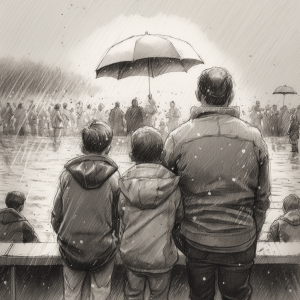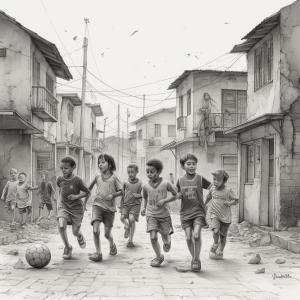Based on years of experience, I would like to offer some advice to parents, uncles, aunts, family friends or elder brothers who with all best intentions in the world, take on the responsibility of helping a young child launch into a soccer career.
It may be a surprise to you, but often it’s the things you don’t do that will help, rather than direct assistance or intervention. Under no circumstance should anyone discourage a child with harsh criticism, let alone ridicule or abuse. Sure you can point out what the child is doing wrong but couple this criticism with corrective advice, preferably through demonstration.
What benfit will a child recieve if you complain that he kicks, heads or traps the ball incorrectly? Explain and tell him why he does it and how he can avoid doing it. For example, its common that a young child cannot header the ball correctly. He heads the ball with the roof instead of the temple or forehead. How to tackle this problem? Demonstrate him the haphazard trajectory of such heading technique and explain the disadvantages. But its extremely important to do this calmly, without undue exaggeration and certainly without turning the demonstration into remonstration. Sarcasm should never be used on children as its the number 1 killer of the child’s self-image.
Children are keen to learn and usually learn fast, don’t make them fear or hate you for making fun of them. At a youth level, all training should be fun at all times. It has been proved that when a child is having fun, the child can train for lengthy periods under high levels of tiring exercises. If the team you coach or involved with can afford only 1 or 2 training sessions a week, don’t cram it with soul-destroying laps of the soccer field. Keep the children entertained and focused and they will physically exert themselves.
Young soccer players up to about 15 or 16 years of age, require very little formalised exercises and running to keep fit. They are extremely fit because of their constant movement, walking and running in school yards and at home. The majority of kids are bursting with excess energy which can be channeled into training sessions. Also remember youngsters “recover” amazingly quickly, even after the hardest of training sessions. Do not focus all your attention on the amount of laps your player or son can run.
If training sessions at youth levels don’t include the soccer ball, you might as well send your players or children to little athletics. The main focus of all training sessions should be Ball Work. Ideally, try to have as many soccer balls as you have players. Also try and limit your squad to 16 players, otherwise the training sessions will always end up in horse play. If for some reason you have a squad that is larger than 16 players get yourself an assistant because you will definitely need him.
In the beginning, the simplest gear should do for training. Any pair of shorts, top and soccer boots is more than adequate. Discourage your players or children from over-dressing for training and dazzling one and other with their brand new gear. The most important and critical piece of gear your child should wear is a “smile”. Anything else at this young age is a waste of money.
Be strict about punctuality. If training is agreed at a certain time make sure you arrive to training at least 10 minutes earlier. This gives enough time for the child to get changed.
Members of a family are not allowed to perform surgery on relatives. This concept should be carried over to the soccer field. Two well known types of parents can destroy a young child’s soccer career.
The first parent is the one who doesn’t care about the child’s soccer career. Never shows interest and doesn’t concern himself with his child’s sporting ambitions. Never attends the matches and never likes to talk about the sport. This lack of interest convinces the boy that his parents don’t care or don’t approve in the sport. Although this sounds rough, this is still the lesser of the two evils.
The second parent is at the other extreme. The parent who wants to prove their own genetic brilliance through their son’s exploits and drive the boy towards an elusive success for which he may not be predestined. Youngsters under the instructions of this parent rarely make it past the age of 13 in the sport. They give up on soccer and never touch the ball again.
Intelligent parents take the middle road. They accept the fact that their healthy, fit son enjoys playing soccer for the game itself and for the new friends he has made. They also take into account the possibilities that occasionally their boy may be injured or hurt and don’t blame the other players or the coach. In other words, they accept the game as a game.
These parents will encourage and help their child, watch his progress, share his thrills and disappointments. Common sense by the parents is all that’s needed to ensure that the boy gets maximum fun out of his soccer. A reasonable schedule which accommodates studies, family duties and other hobbies apart from soccer are also encouraged.
Soccer should be part of his life but it shouldn’t be an obsession. Do not rob them of all the pleasures of their young lives to which they are entitled to. Try not to feed your own sporting failures through your child’s life.



hey nice article for parents, here i am a member of the warrior forum just though i would take a look at your site.
Nice site!
We are waiting for the next posting…